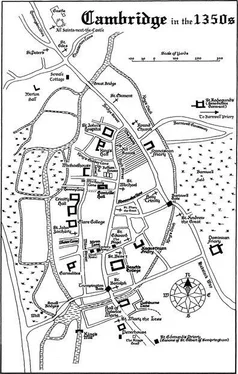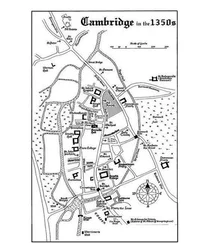‘I doubt that made him happy,’ muttered Michael.
‘And the Bishop’s retainers?’ asked Bartholomew. ‘Where are they?’
‘In my prison, although a few managed to escape. Perhaps they will go to Avignon, to see if de Lisle can use them there. I hope he will be sensible enough to decline their services. Will you try to raise money for him, Brother? He is in desperate need of funds, and you are one of his favourites.’
Michael’s expression was troubled. ‘I would have done, but the antics of Brownsley and Osbern – and the testimonies of Danyell and Spynk – have unsettled me. I see now that de Lisle has used underhand tactics to amass wealth, and I dislike the strong intimidating the weak.’
‘So do I,’ said Tulyet. ‘He claims he knows nothing about what his retainers have been doing, but I am not so sure. They raised a lot of money from their crimes, and he is not stupid. He must have guessed it was coming from somewhere suspect.’
Eventually Tulyet left, and Michael breathed in deeply of the scented summer air. ‘I am glad term has started. We have Clippesby back, and we are rid of William for a while, so things are improving.’
‘Not everything,’ said Bartholomew sadly. ‘I am sorry Carton is dead.’
‘So am I. Still, at least he lies in the right cemetery now – Clippesby arranged it yesterday. I wish he had told us what he had come do; we might have been able to help. It is a pity Jodoca killed him – and a pity Mildenale killed Thomas, too. Still, at least your conscience is eased: it was not your sedative that ended Thomas’s life. And I understand Paxtone and Rougham have changed their minds, and say you were right to have given him a potion that would calm him.’
‘Medicine is not an exact science, Brother. There is more magic in it than you might think.’
John Brownsley knew he was dying, and he blamed the Bishop. He had been a loyal servant for years, but a single careless moment had seen Danyell slip into the London tavern where he was staying and steal the box of coins intended for Avignon. The hoard had contained a fortune – eighteen hundred and five silver shillings and nine gold coins, all packed into a specially made casket. The coins had been raised from revenues imposed by the Bishop, and Brownsley had collected them personally. It had not been pleasant work, because not everyone could pay – and more than one family would starve that winter because he had insisted on taking what was due.
After the theft, Brownsley had tracked Danyell and his friend Spynk all the way to Cambridge, where he had managed to corner the man. Danyell had freely admitted to stealing the box, but had stubbornly declined to say where he had hidden it. The stupid man claimed it was his revenge on the Bishop for terrorising him in Norfolk. And then Danyell had just clutched his chest and died, although neither Brownsley nor Osbern had laid a finger on him. It had taken several searches of Sewale Cottage, but Brownsley had located the hoard in the end. It had been buried near one of the walls in a specially made recess. It was neatly and cleverly done, as he would have expected from a talented mason like Danyell.
It was a safe place, so he had left it where it was, intending to collect it later. He knew the Bishop would be delighted, not only with the brimming box, but with the additional revenue collected by his colleagues along the Huntingdon Way, too. But then everything had turned sour: he and Osbern had been arrested, and Cambridge’s Sheriff had crushed their gang of henchmen.
Brownsley had not been worried at first, because de Lisle had always rescued him in the past, pulling strings, passing bribes and having words in ears. But this time, the Bishop had not bothered. Castle prisons were unhealthy places, and Brownsley had caught a fever. He had seen such sicknesses before, and knew this one was going to kill him.
His original plan had been to claim the hoard as soon as he was released, and take it to Avignon. But the Bishop had not helped Brownsley, so Brownsley did not see why he should help the Bishop. The box could stay where it was, and good luck to it. Perhaps it would bring a smile to someone’s face in the future. He wondered why the book-bearer had not seen it when he had searched. The Welshman was supposed to be observant, so why had he failed to see the clues?
Brownsley closed his eyes, and supposed he would never know.
In October 2000, a remarkable discovery was made in Cambridge. Some 1,805 silver pennies and nine gold nobles or half-nobles were discovered near the corner of Chesterton Lane and Magdalene Street. The silver coins date from around the time of the plague (1348–1350), while the gold ones appear to have been laid on top of them by about 1355. The coins were in an iron-studded wooden chest, which had been placed in a hole near a wall. It seems that the hole was then sealed with a stone, and the room overlaid with a new clay floor. Whether the home improvements were carried out specifically to hide the money, or whether someone just took advantage of a convenient situation will probably never be known.
The hoard would have been a fabulous amount of money in the fourteenth century – perhaps enough to pay an agricultural labourer for six years. Why it was deposited, and by whom, is not known, although it is likely that its owner had every expectation of reclaiming it, but never had the chance. Whoever hid the money probably lived in the house where it was buried, either as its owner or as a tenant. Barnwell Priory is known to have owned property in the area, and records show the building was occupied by one Margery Sewale in the 1450s. The coins and a reconstruction of the chest are on display in the Fitzwilliam Museum in Cambridge.
The Prior of the Augustinians at Barnwell in 1357 was Ralph de Norton. The convent was wealthy and respected, and hosted kings, archbishops and high-ranking nobles. Henry Fencotes was one of its canons in the late fourteenth century, while the Italian Matteo di Podiolo was at the Cambridge convent by 1359.
The Master of Michaelhouse in 1357 was Ralph de Langelee, and his Fellows probably included Michael de Causton, William Gotham, John de Clippesby and Thomas Suttone (who had a namesake – Roger Suttone – at Peterhouse). Edmund Mildenale was a Fellow at the College’s foundation in 1324; he was rector of East Bradenham church in Norfolk during the plague, and lived on until at least 1361. Not much is known about Roger de Carton, except that he was a Michaelhouse Fellow in 1359.
Like most Colleges, Michaelhouse was keen on acquiring property, especially the land and buildings that adjoined it. In the 1340s or 1350s, its scholars were either given or purchased three houses (or shops) from Joan Refham. Her husband had died during the plague, and it was possible that the arrangement included the College’s priests chanting prayers for his soul. The houses stood on ground now belonging to Trinity College, and were later called St Catherine’s Hostel.
Bene’t College (now Corpus Christi) was founded in 1352 with donations from two town guilds: St Mary and Corpus Christi. Its first Master was Thomas Heltisle (or Eltisley); Sir John Goldynham and John Hardy were among the first benefactors. William de Eyton was rector of St Bene’t’s Church in the early 1350s, and later went to South Pool in Devon.
Prior William Pechem ruled the Cambridge Franciscans after the plague, and one of his friars was named Thomas of Irith, who was ordained as a deacon in 1354. Bukenham was a University proctor in the 1330s. Robert Spaldynge was a member of Clare College, and records show he engaged in dubious activities (a fictional account of these is given in To Kill or Cure ).
Читать дальше












